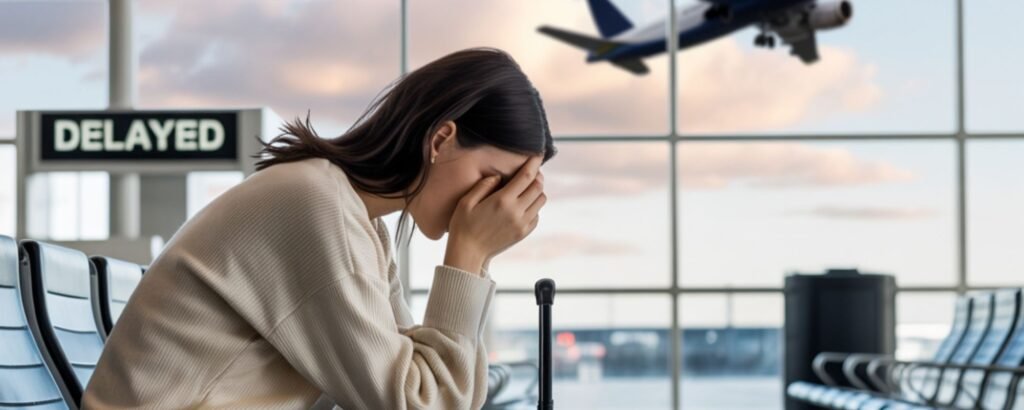
Travelling is an exciting way to explore new cultures, cuisines, and landscapes. But for many, even the idea of packing a bag or stepping onto a plane can stir up feelings of unease. If you’ve ever felt overwhelmed by thoughts of missed flights, unfamiliar surroundings, or things going wrong, you’re definitely not alone.
This guide is here to help. Whether you’re a first-time traveller or a seasoned adventurer, we’ll explore practical tools, personal insights, and helpful techniques to manage and reduce travel-related anxiety—so you can enjoy your journey with more confidence and peace of mind.
What tools can we use to help manage travel anxiety?
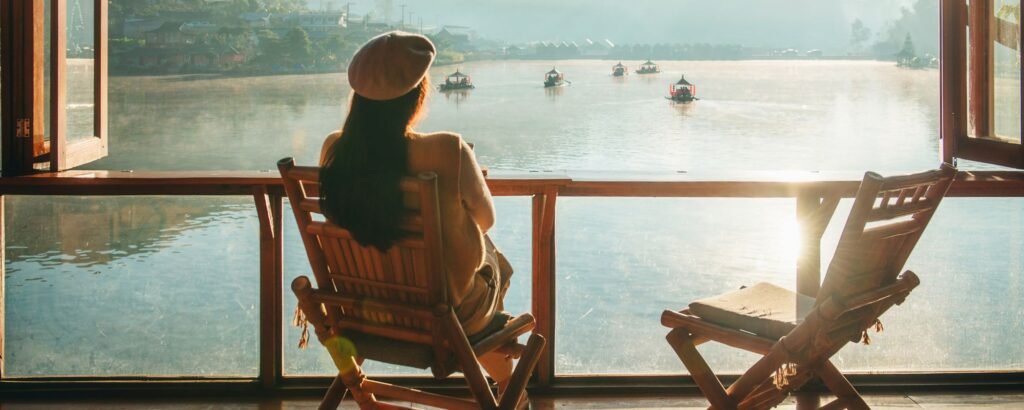
Travel-related anxiety can be eased through a mix of preparation, tech support, and mindfulness. Educational resources such as books and articles can deepen your understanding of anxiety and offer practical coping strategies. Planning apps like TripIt help you organise travel details, while tools like Google Translate reduce stress in unfamiliar language settings.
Mindfulness apps such as Headspace or Calm can be incredibly grounding, especially during moments of high stress. They offer short guided meditations and breathing exercises ideal for airports or long travel days. Travel forums and blogs also provide comfort—reading other people’s experiences can make you feel seen and supported before and during your trip.
A Personal Experience: Travelling with Anxiety
Following the tohu—those subtle signs, gut feelings, and quiet nudges—has become a big part of how we travel. For me, Tania, it’s also been a personal learning journey. Sometimes it flows naturally, other times it’s a bit of a wrestle with my own need for structure. I’m getting better at listening to my instincts, but the truth is, I’ll probably always be a planner at heart.
Living with anxiety, I’ve learned that preparation is everything. I’m not someone who can just go with the flow—I need a plan, a clear picture of what’s ahead. Still, even the best-laid plans don’t always go smoothly, and that’s where learning to trust myself, and the tohu, has made all the difference.
That’s why Toni and I work so well together. She’s calm, 100% on board with planning, but also really cool when things don’t go to plan. She brings a steadiness that helps me find my feet when things wobble. Together, we’ve learned how to make space for both structure and spontaneity—and that’s been key to making travel not just possible, but enjoyable.
Recently, I came across the simplest anxiety technique I’ve ever used—and it didn’t come from a therapist or wellness blog. It was in a werewolf fantasy book, of all places.
I don’t know if it has a formal name, but I call it the 5-4-3-2-1 Sensory Method. It’s incredibly easy to do anywhere, and the best part is, no one even knows you’re doing it.
- 5 things you can see
- 4 things you can touch
- 3 things you can hear
- 2 things you can smell
- 1 thing you can taste
Sometimes I only get to 3 before I feel grounded again. Other times I loop around a few times. But it’s probably the first method I can honestly say works for me, every time.
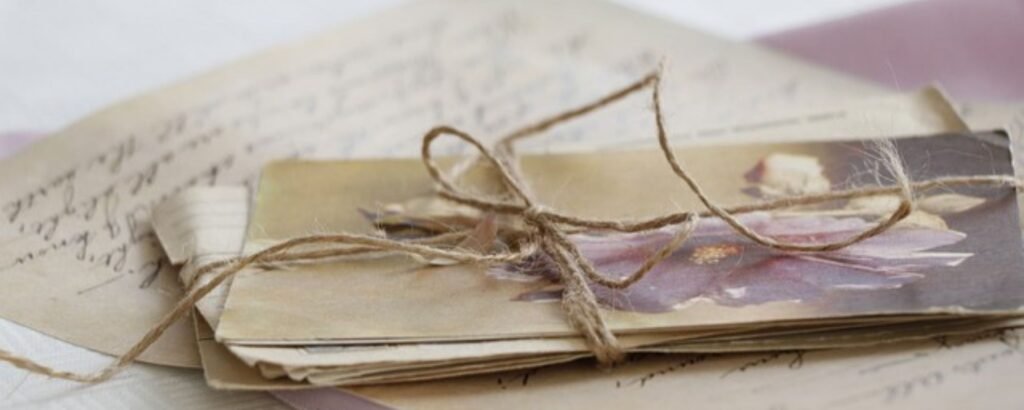
Table of Contents
- What Tools Can We Use to Help Manage Travel Anxiety?
- A Personal Experience: Travelling with Anxiety
- Build a Strong Mental Foundation
- Travel Smart: Set Yourself Up for Comfort
- Use Tools and Technology to Feel in Control
- Take Care of Your Body and Mind
- Stay Grounded and Encouraged
- Resources for Travel Anxiety Relief
- Additional Tips
- Final Thoughts on Managing Travel Anxiety
Build a Strong Mental Foundation
These strategies focus on understanding and mentally preparing for your travel experience.
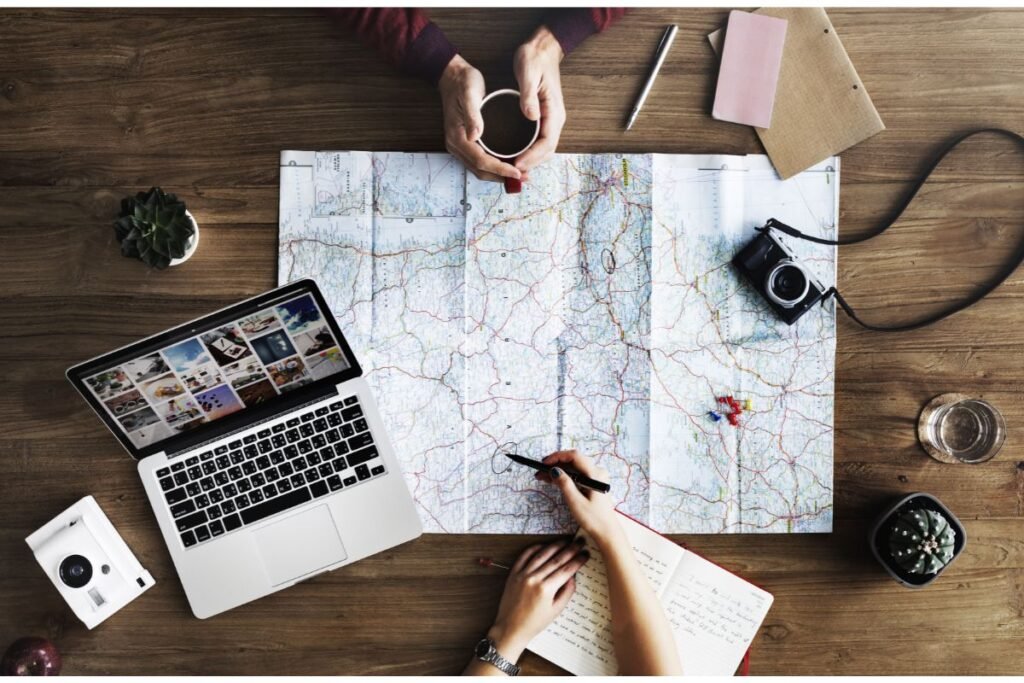
Understand the Root of Your Anxiety
Travel anxiety can feel overwhelming, but the first step toward overcoming it is recognising where it comes from. For many, anxiety is triggered by specific fears—such as flying, getting lost, or not being able to communicate in a new language. Concerns about safety, health, or losing control over plans are also common.
Sometimes, the anxiety is linked to a past negative experience: missing a flight, falling ill abroad, or feeling overstimulated in a chaotic environment. And for others, it’s not even tied to a clear reason. It’s just that gnawing “what if?”—what if the luggage is lost, the plane is delayed, or things don’t go to plan?
Helpful Approaches
Taking time to reflect on what specifically makes you anxious about travelling is a great starting point. Journaling can help you map your thoughts and identify patterns. Once you’ve spotted your triggers, you can begin to address them with practical steps. For example:
- Fear of flying: Practice breathing techniques, try soothing audio from apps like Calm, or talk to your doctor about short-term medication options.
- Fear of the unknown: Research your destination to create a sense of familiarity. Watch videos, read travel blogs, and explore review sites. Build a flexible itinerary to add structure without the stress of a rigid plan.
- Negative past experiences: Remind yourself that one bad moment doesn’t define all future travels. Focus on small wins—day trips, weekend breaks, or positive moments from past journeys—to rebuild trust in yourself.
By understanding the root of your anxiety, you give yourself a sense of control. Instead of letting vague fears take over, you can take informed, compassionate steps toward more confident travel.
Start with Short Trips
If the idea of long-haul flights or complex travel plans makes your heart race, start small. Short trips—like day outings or weekend getaways—are a gentle way to ease into travel. They allow you to practise the essentials: packing, navigating new environments, and adjusting your routine, but without the pressure of being far from home.
These manageable journeys act as “practice runs,” helping you understand your anxiety triggers in real-time. You’ll build skills and confidence while staying within a comfort zone that feels safe.
Helpful Approaches
Short trips give you space to create positive travel experiences without overwhelming your senses. Here are a few ways to make them work for you:
- Start familiar: Pick destinations close to home or revisit a place you already know—but add a new twist, like staying in different accommodation or trying a new activity. Familiarity reduces the fear of the unknown while still giving you something fresh to enjoy.
- Focus on enjoyment: Don’t overload your schedule. Choose one or two meaningful activities, like visiting a favourite café or exploring a quiet walking trail. A slower pace helps reduce stress and allows you to stay present.Reflect and adjust: After each trip, take note of what worked and what didn’t. Was packing a hassle? Were the crowds okay? Use what you learn to fine-tune your next journey
Short trips might seem small, but they’re powerful. Each success adds to your confidence, helping you build the emotional resilience needed for longer, more adventurous travel later on.
Prepare in Advance
One of the most effective ways to reduce travel anxiety is to prepare well ahead of time. When you know what to expect and have your essentials sorted, you can begin your journey feeling calm, confident, and in control.
Preparation helps eliminate last-minute panic and creates a sense of structure—something that’s incredibly helpful if uncertainty triggers your anxiety about travelling.
Helpful Approaches
Use these simple steps to make your pre-travel routine more organised and less stressful:
- Create a packing checklist: Write down everything you’ll need—travel documents, medications, chargers, and clothing. Tick items off as you go to avoid forgetting anything important.
- Organise your documents: Keep your passport, boarding passes, and bookings together in one secure spot. You can use a travel wallet or a digital folder on your phone for quick access.
- Know your itinerary: Familiarise yourself with your flight times, accommodation check-ins, and transport options. The more you know, the less there is to worry about.
- Double-check logistics: Confirm bookings, review baggage limits, and save addresses of places you’re staying. A little double-checking can go a long way in reducing last-minute stress.
Being prepared isn’t about being perfect—it’s about giving yourself the best chance to travel with ease. A little planning now can create a much calmer experience later.
Familiarize Yourself with Your Destination
Fear of the unknown is one of the most common causes of travel anxiety. But the more you learn about your destination in advance, the less intimidating it becomes. Gaining insights into local customs, culture, and even learning a few phrases in the local language can ease uncertainty and replace it with anticipation.
Understanding what to expect helps you feel more comfortable when you arrive. It also allows you to connect more easily with locals and appreciate what makes the place unique. Platforms like YouTube are especially useful, offering travel vlogs, virtual tours, and firsthand experiences to help you prepare.
Helpful Approaches
- Research cultural norms and expectations: Learn about local customs, dress codes, and polite behaviours. This helps you avoid unintentional mistakes and shows respect to the people and place you’re visiting.
- Learn essential phrases: Even a few words—like “Hello,” “Thank you,” or “Where is…?”—can boost your confidence and ease communication barriers.
- Watch travel vlogs: YouTube is packed with helpful content. Search for travel videos about your destination to get a visual sense of the area, local attractions, and food scenes.
- Map out key areas: Familiarise yourself with the general layout—know where your accommodation is, the nearest convenience stores or cafes, and key transport hubs. Having a mental map makes the unfamiliar feel much more manageable.
When you take time to learn about your destination, it starts to feel less foreign. That shift—from uncertainty to familiarity—can go a long way in reducing anxiety about travelling.
Travel Smart: Set Yourself Up for Comfort
These steps are about making practical travel adjustments to ease anxiety.
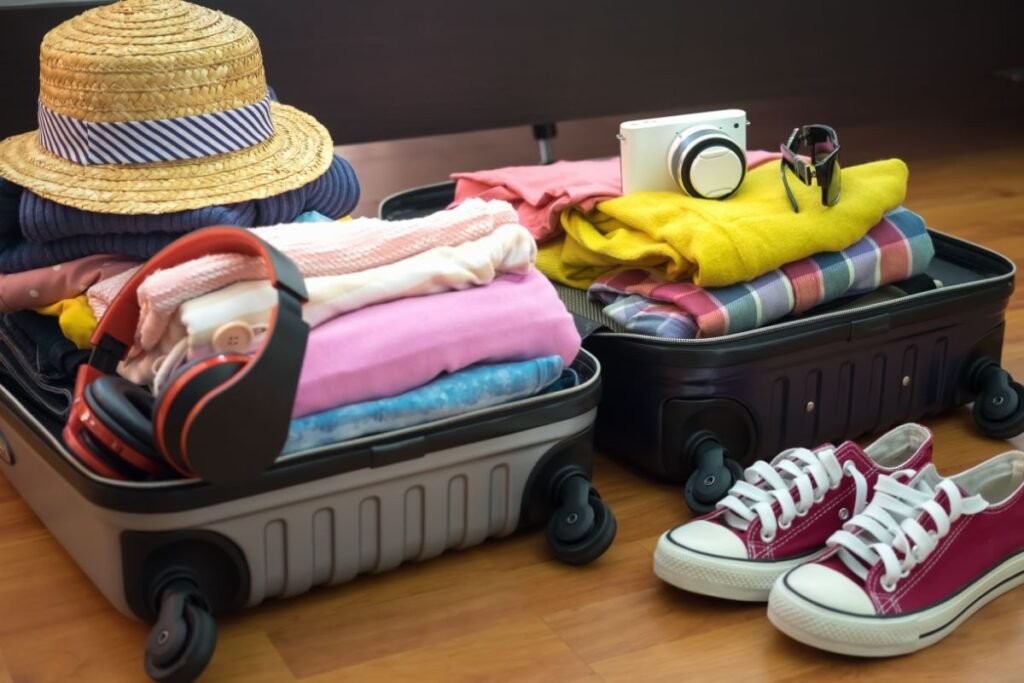
Inform Your Accommodations of Your Concerns
Clear communication with your accommodation can make a big difference in easing travel-related anxiety. Whether you’re staying in a hotel, guesthouse, or Airbnb, many hosts are open to accommodating special requests—especially if you let them know in advance.
Taking a proactive approach helps set the tone for a smoother stay. When your preferences and needs are known, you’re more likely to feel comfortable, cared for, and less stressed during your trip.
Helpful Approaches
- Share preferences in advance: Let your accommodation know if you’d prefer a quiet room, early check-in, or specific extras—like extra pillows, a fan, or access to a fridge for medications.
- Ask about anxiety-easing amenities: Some small comforts can go a long way. Confirm things like blackout curtains, access to a kettle, or how close your room is to the lift or exits.
- Highlight special requirements: If you have dietary restrictions, mobility needs, or allergies, give the accommodation a heads-up. Most places will gladly help if they have time to prepare.
- Stay connected: Establish a clear point of contact—like the front desk or host—so you have someone you can easily reach out to during your stay. Knowing help is nearby can bring real peace of mind.
When accommodations know your needs, they’re better equipped to support your comfort. This simple communication step can reduce anxiety and help you feel more settled from the moment you arrive.
Focus on the Positive
When anxiety begins to surface, focusing on what’s going right can make all the difference. Shifting your mindset from fear to gratitude helps create emotional balance and can ease travel-related anxiety. The more you train your mind to notice positive moments, the less power anxious thoughts have over your day.
Helpful Approaches
- Start a gratitude practice: Each day, note something small and meaningful—a stunning sunset, a warm smile from a stranger, or a delicious local dish. These reflections build emotional resilience.
- Use positive affirmations: Repeating phrases like “I can handle whatever comes my way” can help re-centre your thoughts when anxiety starts to rise. Affirmations are small but powerful reminders of your strength.
- Document uplifting moments: Take a few photos or jot down highlights in a travel journal or app. When anxiety creeps in, looking back on these wins can help you stay grounded.
- Reframe challenges: Not everything goes to plan—and that’s okay. If you get lost, see it as a chance to explore somewhere unexpected. These reframes turn stress into opportunity.
Even the smallest positive moments can help you feel more calm, present, and empowered. By actively noticing the good, you train your mind to focus on joy rather than fear.
Have a Backup Plan
For someone like me, this might just be one of the most important tips on the list. When you live with travel-related anxiety, having a backup plan can mean the difference between panic and peace. Even with the best preparation, things can still go wrong—but knowing you have a plan B can help you stay grounded when the unexpected happens.
Whether it’s a missed flight, a delayed train, or misplaced luggage, having a few contingencies in place allows you to respond with confidence instead of fear.
Helpful Approaches
- Know your alternatives: Before you travel, research backup transportation options or alternative flight routes. Knowing how you’ll get to your destination—even if plans change—adds a layer of security.
- Keep document copies: Save digital versions of important documents like your passport, visa, and bookings in cloud storage or your email. Carry paper copies in a separate bag for extra peace of mind.
- Pack a small survival kit: Include a spare change of clothes, essential toiletries, medications, and snacks in your carry-on. This way, you’re not left uncomfortable during unexpected delays or luggage mishaps.
- Identify local resources: Take note of where the nearest pharmacy, hospital, or embassy is located. You might never need them—but if you do, you’ll be glad you know.
Having a backup plan isn’t about expecting disaster—it’s about being prepared enough to ride out the bumps without losing control. That kind of confidence is one of the best defences against anxiety while travelling.
Seek Help
If your travel anxiety becomes overwhelming or starts interfering with your ability to enjoy the experience, seeking professional support can be a life-changing step. Reaching out isn’t a sign of weakness—it’s a proactive way to strengthen your mental wellbeing and prepare for more confident, stress-free travel.
Mental health professionals, especially those who specialise in anxiety disorders, can offer tools tailored to your personal needs and travel goals. Having that extra layer of support can make all the difference.
Helpful Approaches
- Consider therapy sessions: Talking with a counsellor or therapist can help you identify your anxiety triggers and develop long-term coping strategies. Cognitive Behavioural Therapy (CBT) is particularly effective for managing travel-related anxiety.
- Explore online therapy options: Many providers now offer virtual sessions, making it easier to access help whether you’re at home or already on the road.
- Join a support group: Hearing from others who experience anxiety while travelling can reduce feelings of isolation. Online groups and forums offer shared wisdom, encouragement, and solidarity.
- Try mental health apps: Platforms like BetterHelp, Woebot, and Sanvello offer accessible, self-paced ways to track your mood, build coping skills, and access professional advice.
Seeking help is one of the most empowering things you can do. It equips you with practical tools and emotional reassurance so you can navigate the challenges of travel with greater ease and self-trust.
Use Tools and Technology to Feel in Control
Let digital support and structure take some of the pressure off.
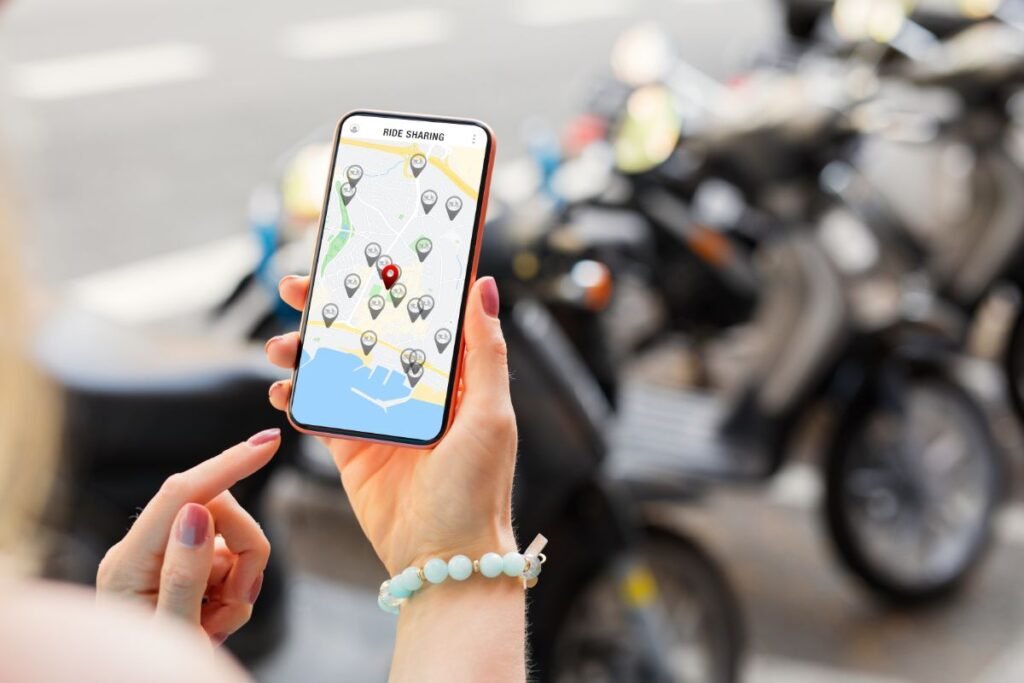
Use Technology to Your Advantage
When used thoughtfully, technology can be one of the most powerful tools for managing travel anxiety. From maps to translation apps and itinerary organisers, the right tech helps reduce uncertainty and keep you in control—no matter where your journey takes you.
Having key information at your fingertips eases the mental load, especially when the unexpected happens. With the right apps on hand, navigating unfamiliar places feels a lot less daunting.
Helpful Approaches
- Navigation apps: Tools like Google Maps and Maps.me can help you find your way whether you’re walking through a crowded city or driving in remote areas. Download offline maps before your trip so you can still access directions without Wi-Fi or mobile data.
- Translation tools: Apps such as Google Translate or iTranslate bridge communication gaps, especially in destinations where English isn’t widely spoken. Many also offer offline functionality, so you’re never stuck without a way to ask for help.
- Itinerary planners: Keep all your bookings and plans in one place with apps like TripIt or Google Travel. This helps you avoid the stress of digging through emails for flight times or hotel check-ins when you’re already on the move.
- Alerts and converters: Set up flight alerts, weather updates, and currency exchange tools to stay informed. These small details can help you feel more in control and reduce anxiety on the go.
Technology can’t eliminate travel anxiety—but it can give you a sense of preparedness and confidence. Just don’t forget a portable charger to keep your devices ready for anything!
Develop a Travel Routine
When dealing with travel anxiety, consistency can become a powerful ally. The unpredictable nature of travel often heightens anxious feelings—but establishing a simple routine can bring back a sense of control and comfort.
Whether it’s how you pack, your pre-departure habits, or your daily rhythm on the road, building familiar routines helps you stay grounded in unfamiliar environments. These small, steady rituals can ease mental load and create a sense of stability during your journey.
Helpful Approaches
- Pre-travel rituals: Start your trip on a calm note with a pre-travel routine. Double-check documents, pack the night before, or play your favourite music while getting ready. These small actions create familiarity before you even leave home.
- Packing system: Use a packing checklist or packing cubes to organise your gear the same way every time. Knowing exactly where things are can reduce pre-trip stress and make your time away feel more manageable.
- Morning routine: Whether it’s sipping coffee, stretching, or reviewing your plans for the day, a simple morning habit helps bring clarity and structure to unfamiliar days.
- Wind-down routine: Create a relaxing end-of-day ritual, like journaling, reading, or enjoying herbal tea. These quiet moments help maintain balance, no matter where you are.
Establishing a travel routine doesn’t just calm your nerves—it frees up energy and attention for the good stuff: exploring, connecting, and soaking in new experiences.
Try Mindfulness and Meditation
In moments of travel stress, a calm mind can be your greatest ally. Practising mindfulness and meditation helps you stay grounded and manage anxiety—even in busy, unfamiliar environments. Whether it’s a guided meditation or a simple breathing exercise, these tools offer a mental anchor that can restore your focus and bring emotional balance.
You don’t need hours or a quiet retreat—just a few mindful minutes can make a meaningful difference when you’re navigating travel anxiety.
Helpful Approaches
- Breathing exercises: Try a simple technique like the 4-4-4 method: inhale for four counts, hold for four, exhale for four. This helps calm your nervous system in stressful situations like airport queues or noisy crowds.
- Mindfulness on the go: Gently bring your attention to the present by engaging your senses. Notice colours, sounds, and scents around you without judgment. This can interrupt anxious thought patterns and ground you in the moment.
- Meditation apps: Use apps like Calm, Headspace, or Insight Timer for guided meditations designed for anxiety relief. Many offer short sessions—perfect for when you’re waiting at a gate or winding down at the end of the day.
- Gratitude check-ins: Take a moment each evening to reflect on one positive part of your day. Whether it’s a beautiful view or a kind smile from a stranger, focusing on small wins helps create a more peaceful mindset.
Mindfulness and meditation won’t erase anxiety—but they can help you meet it with more clarity, patience, and self-compassion. Over time, these practices can transform how you respond to stress, making travel feel more manageable and meaningful.
Get a Travel Buddy or Travel in a group
Travelling with someone you trust—or joining a group—can offer a huge sense of relief when managing travel anxiety. A familiar presence provides reassurance, helps with decision-making, and can make the experience feel far less overwhelming.
Whether it’s a close friend, partner, or an organised tour group, being with others helps you feel safer, more supported, and less alone when exploring new places.
Helpful Approaches
- Travel with someone who understands you: Choose a companion whose travel style matches yours and who respects your needs when anxiety arises. A supportive travel buddy can offer calm encouragement during stressful moments.
- Join a group tour: If you’re travelling solo but crave structure and company, guided tours offer safety in numbers and opportunities to connect with like-minded travellers.
- Share responsibilities: Divide tasks like booking accommodation, navigating, or ordering meals. Sharing the workload reduces stress and keeps anxiety from piling up.
- Create shared memories: Whether it’s discovering a new city or relaxing at a quiet beach, having someone to share the moment with can transform travel from stressful to joyful.
Having a travel buddy—or even just the presence of a group—adds a comforting layer of emotional support. That connection makes unfamiliar environments feel more manageable, especially when you’re navigating anxiety while travelling.
Take Care of Your Body and Mind
Sometimes the smallest physical adjustments can have the biggest impact on how you feel.

Sometimes the smallest physical adjustments can have the biggest impact on how you feel.
Sleep is one of the most underrated tools for managing travel anxiety. When you’re well-rested, you’re more emotionally resilient and better able to handle the unpredictability of travel. Fatigue, on the other hand, can heighten anxiety and make even small challenges feel overwhelming.
Maintaining a consistent sleep routine while travelling helps stabilise your mood, reduce stress, and set the tone for more balanced days on the road.
Helpful Approaches
- Maintain a sleep schedule: Try to go to bed and wake up at roughly the same times each day—even when changing locations. This helps your body adjust and supports a healthy circadian rhythm.
- Create a restful environment: Block out noise and light with earplugs, an eye mask, or a white noise app. Bring familiar comforts like your own pillowcase to help make unfamiliar rooms feel more like home.
- Avoid screens before bed: Limit screen time at least 30 minutes before sleep. Instead, wind down with a calming book, music, or a short meditation to ease your mind.
- Limit caffeine and heavy meals: Avoid consuming caffeine or rich meals close to bedtime. Both can interfere with your ability to fall and stay asleep.
- Combat jet lag: If you’re crossing time zones, begin shifting your sleep and wake times in the days before departure. Once you arrive, get natural sunlight to help reset your internal clock.
Prioritising quality sleep isn’t just about rest—it’s a key part of managing your mental health while travelling. With better sleep, you’ll feel more energised, clear-headed, and emotionally prepared for the adventure ahead.
Pack Comfort Items
When you’re managing travel anxiety, comfort can come from the smallest things. Packing familiar, calming items helps bring a sense of normalcy and stability while you’re away from home. These personal touches act as grounding anchors, offering emotional relief in unfamiliar environments.
Whether it’s a well-loved book or a favourite scent, surrounding yourself with things that feel safe and familiar can ease anxiety while travelling and help you feel more at ease on the road.
Helpful Approaches
- Bring a favourite book or playlist: Familiar stories or music can offer a comforting escape during long waits, noisy transit, or quiet moments of rest.
- Carry sentimental items: A meaningful photograph, small piece of jewellery, or travel keepsake can bring a sense of reassurance and connection to home.
- Use calming scents: A travel-sized essential oil or pillow spray—especially with soothing scents like lavender or eucalyptus—can help you relax and sleep better in new places.
- Pack for cosy comfort: Include a soft travel blanket, reusable tea mug, or your go-to herbal tea sachets. These little luxuries make unfamiliar spaces feel more inviting.
- Consider sensory items: If certain textures or items calm you—like a soft scarf, a fidget tool, or a weighted eye mask—make them part of your essentials.
These personal items may seem small, but they create a pocket of calm that travels with you. When anxiety strikes, your familiar comforts are right there to help you feel grounded and supported.
Avoid Caffeine and Alcohol
This one used to be especially hard for me. Like many people, I once relied on an alcoholic drink—or two—to calm my nerves before a flight. It felt like the quickest way to take the edge off. Or even to celebrate that we are going on holiday. But over time, I learned that alcohol (and even caffeine) often made my travel anxiety worse, not better.
While these drinks might offer short-term relief or energy, they can also increase restlessness, disrupt sleep, and leave you feeling more anxious in the long run. Choosing calming, hydrating alternatives can help you stay more emotionally balanced and physically well throughout your trip.
Helpful Approaches
- Opt for herbal teas: Soothing options like chamomile, peppermint, or lavender tea can help calm your nervous system and promote relaxation without the side effects of caffeine or alcohol.
- Stay hydrated: Drinking water regularly throughout your journey helps prevent dehydration, which can increase irritability, tension, and fatigue.
- Limit sugary drinks: Sweetened beverages can lead to energy crashes and mood swings. Choose drinks that hydrate and nourish your body steadily.
- Try non-alcoholic alternatives: In social settings, consider a mocktail or sparkling water with lime. You’ll stay refreshed without the risk of post-drink anxiety or dehydration.
- Pair drinks with healthy snacks: Combine your beverages with nutritious options like fruit, nuts, or granola bars to stabilise blood sugar and keep your mood steady.
By reducing your intake of caffeine and alcohol, and embracing calming alternatives, you support a steadier emotional foundation—one that makes it easier to manage anxiety while travelling and enjoy the journey more fully.
Educate Yourself on Flight Mechanics
Fear of flying is one of the most common forms of travel anxiety—but knowledge can be a powerful antidote. Understanding how planes work, what causes turbulence, and the layers of safety built into air travel can help replace fear with facts.
Learning about the science behind flight can give you a sense of control, helping you feel calmer, more informed, and less overwhelmed by the unknown.
Helpful Approaches
- Learn the basics of flight: Research how planes achieve lift, maintain balance, and manage turbulence. Knowing that turbulence is normal—and rarely dangerous—can ease panic during rough air.
- Watch educational videos: YouTube channels and documentaries featuring pilots and engineers often explain flight mechanics, engine sounds, and safety procedures in simple, reassuring ways.
- Take a fear-of-flying course: Many airlines and mental health organisations offer courses that include simulations and expert-led sessions designed to build confidence and reduce anxiety.
- Talk to experienced travellers: Hearing calm, positive stories from frequent flyers can provide reassurance and help normalise the experience.
- Explore aviation data sites: Tools like FlightRadar24 offer real-time maps showing thousands of planes in the sky—offering visual proof that air travel is safe, frequent, and highly regulated.
By educating yourself about flight, you begin to demystify the experience. And with that understanding, travel anxiety around flying can slowly be replaced with curiosity, trust, and a greater sense of calm.
Stay Grounded and Encouraged
These final strategies focus on community, mindfulness, and celebrating progress.

Join a Support Group
One of the most powerful tools for managing travel anxiety is knowing you’re not alone. Support groups—whether online or in-person—offer a safe, understanding space to share your experiences and learn from others navigating the same challenges.
Being part of a community helps reduce feelings of isolation and provides encouragement from people who truly understand what you’re going through. It’s also a great way to discover new strategies for managing anxiety while travelling.
Helpful Approaches
- Join online communities: Platforms like Facebook, Reddit, and dedicated travel forums host groups where people share honest conversations, practical tips, and emotional support.
- Look for local meet-ups: Some cities offer in-person anxiety support groups or workshops focused on managing fear of travel. These face-to-face connections can be grounding and validating.
- Participate in virtual events: Many mental health organisations now offer virtual sessions or webinars, making it easier to access help no matter where you are.
- Celebrate small wins: Share your progress—whether it’s completing a flight or enjoying a stress-free outing. Your story might uplift someone else and reinforce your own growth.
- Learn from others’ journeys: Hearing how others have overcome their travel-related fears can introduce new ideas and offer a powerful sense of hope.
Support groups foster community, confidence, and courage. Knowing you have others cheering you on makes facing travel anxiety feel far more manageable—and far less lonely.
Focus on the Present
When you’re dealing with travel anxiety, your mind often jumps ahead—imagining everything that might go wrong. But focusing on the present moment can bring clarity and calm. By tuning into what’s happening right now, you stop anxiety from spiralling and start to feel more in control.
Appreciating each small moment as it comes can shift your mindset from stress to presence—one step, one breath, one experience at a time.
Helpful Approaches
- Break it down: Don’t think about the whole trip at once. Just focus on one step—checking in at the airport, ordering lunch, finding your seat. It’s easier to stay calm when you take things moment by moment.
- Use grounding techniques: When anxiety starts to rise, try the 5-4-3-2-1 method:
→ Name 5 things you see,
→ 4 things you can touch,
→ 3 things you hear,
→ 2 things you smell,
→ and 1 thing you taste.
This sensory exercise helps bring you back to the here and now. - Practise mindful observation: Pause to notice colours, textures, and sounds around you. Whether you’re at a train station or on a mountaintop, fully observing your surroundings helps you connect to the moment.
- Avoid multitasking: Try giving your full attention to one thing at a time—whether it’s watching the scenery or navigating public transport. You’ll feel more present and less overwhelmed.
- Use grounding affirmations: Simple phrases like “Right now, I am safe” or “In this moment, I am okay” can help quiet racing thoughts and bring you back to what’s real.
By focusing on the present, you reduce the power of anxious thoughts while travelling. You give yourself the gift of presence—and the chance to experience joy in the moment instead of fear of what might come.
Stay Connected
When you’re travelling—especially solo—it’s easy to feel isolated. But regular contact with loved ones back home can be a powerful anchor when travel anxiety starts to creep in. A simple message or call can remind you that you’re not alone, no matter how far from home you are.
Staying connected offers emotional support while travelling, helping you feel safer, seen, and grounded—even in unfamiliar places.
Helpful Approaches
- Schedule regular check-ins: Set specific times to call or message family and friends. Knowing you’ll talk to someone soon can provide comfort during moments of anxiety or uncertainty.
- Share your itinerary: Give someone you trust a copy of your travel plans. This helps them stay informed and gives you an added sense of safety, especially if plans shift.
- Use messaging apps: Tools like WhatsApp, Messenger, or Signal let you share real-time updates, photos, and stories without relying on expensive international plans.
- Try virtual hangouts: Video call a loved one while exploring a market or relaxing in your accommodation. Sharing live moments helps bridge the distance and creates a shared experience, even across time zones.
By staying connected, you maintain a comforting link to the familiar. That sense of emotional support can reduce travel anxiety, helping you feel more stable and confident as you explore the world.
Celebrate Your Achievements
When you’re managing travel anxiety, even small wins are worth celebrating. Recognising your progress not only builds confidence—it reinforces the truth that you’re capable of navigating challenges and growing through them.
These milestones are powerful reminders: you’re not just surviving your journey—you’re becoming a more resilient, empowered traveller.
Helpful Approaches
- Reflect on your wins: Did you board a flight without panic? Ask for directions in a new language? Each moment where you faced anxiety and kept going is a victory—acknowledge it.
- Track your progress: Create a timeline or journal showing how your travel confidence has evolved. Seeing how far you’ve come offers motivation and proof of your growth.
- Reward yourself: Celebrate meaningful moments with something that brings joy—whether it’s a relaxing self-care day, a special photo, or ticking an experience off your bucket list.
- Share your journey: Talk about your milestones with trusted friends or support groups. Their encouragement can deepen your sense of pride and keep you moving forward.
By honouring your progress in overcoming travel anxiety, you build a strong foundation of self-belief. And with that confidence, you’re ready to take on even more meaningful, fulfilling adventures.
Resources for Travel Anxiety Relief
Managing anxiety while travelling becomes much easier when you have the right tools at your fingertips. Whether you’re mid-flight or settling into a new destination, these resources can help create moments of calm and control.
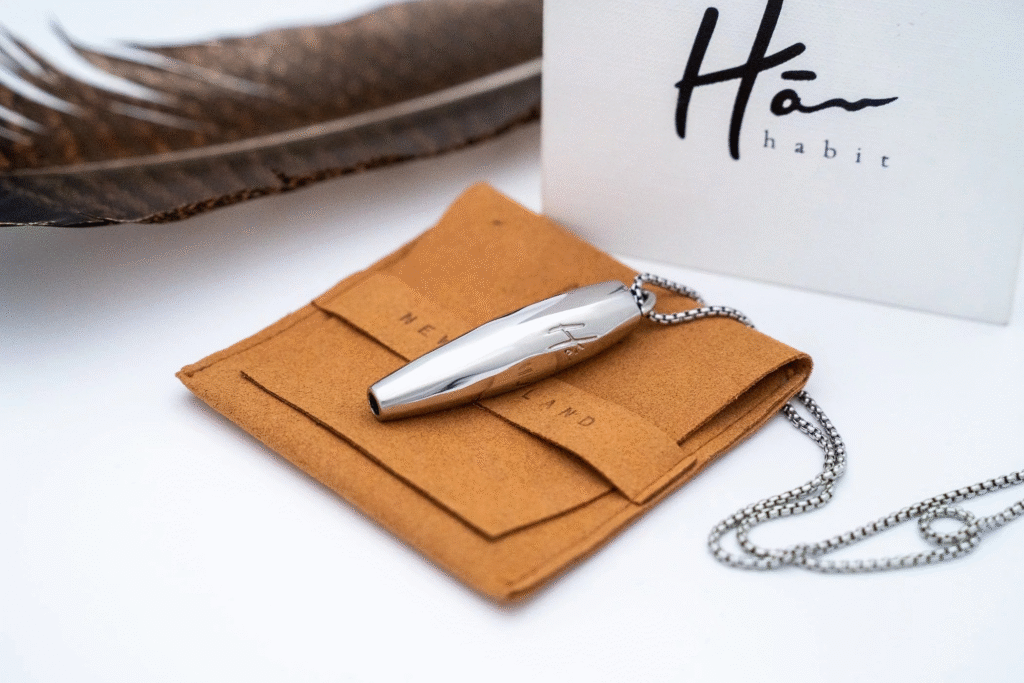
- Deep breathing exercises: Simple techniques like box breathing (inhale for 4 counts, hold for 4, exhale for 4, hold for 4) can calm your nervous system and reduce panic in real-time. Practice regularly for best results.
- Discover HaHabitNZ: HaHabitNZ is a wellness platform designed to help you stay balanced amidst life’s chaos—perfect for travellers seeking emotional regulation on the go.
👉 Click here to explore HaHabitNZ - Meditation apps: Apps like Headspace, Calm, and Insight Timer offer guided meditations, breathing sessions, and sleep stories. They’re ideal for managing travel anxiety whether you’re in transit or trying to unwind at night.
- Noise-cancelling headphones: These can turn noisy environments like airports or buses into peaceful spaces. Sony is a trusted brand known for excellent sound quality and comfort.
Additional Tips

- Test tools before travel: Try apps, breathing techniques, and playlists at home so you know what works best for you in the moment.
- Download for offline access: Poor internet connections are common when travelling. Download meditations, music, and breathing guides in advance so you’re always prepared.
- Customise your toolkit: Everyone’s anxiety is different. Whether it’s a lavender oil roller, a favourite playlist, or a photo that grounds you—bring what brings you calm.
Integrating these tools into your travel routine can create a smoother, more enjoyable experience. You don’t need to have it all figured out—just a few supports can go a long way.
Final Thoughts on Managing Travel Anxiety
Travel-related anxiety is real, but it doesn’t have to hold you back. With thoughtful planning, personalised tools, and a mindset of curiosity over fear, you can experience the joy and freedom of travel.
You’ve already taken a powerful step by acknowledging your anxiety and seeking strategies that work for you. Every small win matters. Each trip you take, no matter how near or far, is proof of your resilience.
So breathe deeply, move at your own pace, and remember: the world is full of beauty waiting to be seen—with you in it.
Kia hora te marino, Kia whakapapa pounamu te moana, kia tere te Kārohirohi i mua i tōu huarahi
May the calm be widespread, may the ocean glisten like a gemstone, may the shimmer of light dance across your path